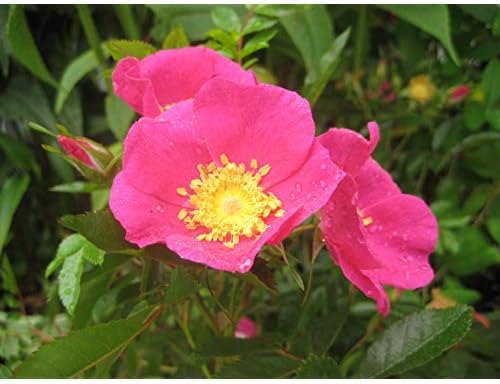Virginiana rose

The Charm of the Virginiana Rose
The Virginiana Rose, also known as Rosa virginiana, is a captivating rose that thrives in various garden settings. Known for its robust nature and striking pink blooms, this rose is an excellent choice for gardeners looking to add natural beauty to their landscapes. With its strong fragrance and ornamental hips, the Virginiana Rose is a unique and valuable addition to any garden.
A Brief Overview of Virginiana Rose
This medium pink species rose is a hardy and resilient plant. It blooms once in spring or summer, producing medium-sized, single flowers with 4-8 petals. The blooms, which have a strong fragrance, are usually borne solitary or in small clusters, making them a delightful sight in any garden.
Virginiana Rose grows to a height of 5 to 7 feet, with a spread of about 3 feet. The plant has glossy foliage with 7 to 9 leaflets, which turn colorful in the autumn, adding seasonal interest. Despite its bushy, upright habit, this rose can be armed with thorns or prickles, although some varieties may have few or no thorns.
Ideal Growing Conditions
Virginiana Rose thrives best in dry, sandy, and sometimes saline habitats. It prefers fertile, humus-rich soil that is moist but well-drained. This rose performs well in sunny, open positions, making it suitable for various garden styles, including cottage gardens, informal gardens, and wildlife gardens.
Planting and Care Tips
Plant the rose in a location with plenty of sunlight for optimal growth. In late winter, mulch around the base of the plant to help retain moisture and suppress weeds. To encourage better flowering, apply a balanced fertilizer in late winter or early spring.
Pruning is essential for maintaining the health and shape of the Virginiana Rose. Following pruning group 20 guidelines, which apply to shrub roses, is recommended. Avoid deadheading the flowers if you want to enjoy the decorative hips. These hips, which are red and pumpkin-shaped, provide visual interest well into winter.
Dealing with Pests and Diseases
Virginiana roses, like many roses, may be susceptible to common pests such as aphids, rose leafhoppers, and scale insects. They can also be affected by diseases like rose black spot, rust, and powdery mildew. Regular monitoring and proper care can help prevent these issues from becoming severe.
Additionally, deer and rabbits might threaten the plant, so protective measures may be necessary in areas where these animals are common.
Characteristics
- Flower Color: Medium pink
- Bloom Form: Single (4-8 petals), borne mostly solitary or in small clusters
- Fragrance: Strong
- Height: 5 to 7 feet
- Width: 3 feet
- Foliage: Glossy with 7 to 9 leaflets, colorful in autumn
- USDA Zones: 3b and warmer
- Habit: Bushy, upright
- Bloom Time: Once-blooming in spring or summer
- Additional Features: Produces decorative red, pumpkin-shaped hips
The Virginiana Rose is not just a beautiful addition to your garden; it’s a testament to the resilience and charm of species roses. With its strong fragrance, striking blooms, and decorative hips, this rose will surely bring joy and beauty to any garden setting.
